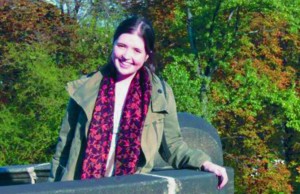Czech Lee out: Story of off-campus study 
Lee McKinstry ’13 shares stories from her study abroad experience in Prague
Lee McKinstry
Staff Writer
When you read this, I might be eating guláš. This seems to be what I spend most of my time doing in Central Europe, as the bread dumpling and meat sauce dish is one of the most popular cuisine options in the region, and is really, seriously delicious. I might also be listening to someone play the accordion – I’ve been to two traditional Czech music concerts since I arrived in Prague this September, and pass a number of street musicians on my way to class. Or, I could be milking a goat. This is probably the least likely option, but I have clenched my fingers around some lady livestock’s udders lately, so I wouldn’t entirely rule it out.
Since I’ve arrived in the Czech Republic, the list of things I never thought you’d find me doing has grown incredibly, even beyond the most extreme “study abroad” examples I’m citing. After “moving” to Prague, Czech Republic I have learned to stop trying to have these kind of expectations. The nation, which was under communist control from 1948-1989, is now known in the West for its peaceful, arts-driven “Velvet Revolution,” and as a thriving creative center and socially progressive nation. It has been this place and more for me, and I’ve spent a lot of my stay emailing everyone back home telling them that they have to come here. I have loved my time here (which thankfully isn’t quite over yet) more than I could have imagined, for a number of very lengthy reasons. I’ll try to pinpoint just a few.
I wanted to come to Prague because of the admittedly romantic image I had of the city. A place where a student- and artist-driven rebellion had overrun the Soviet regime, where Kafka lived on the banks of the Vltava River, where a new generation of artists are thriving today — I wanted in. In most ways, the city has not disappointed. I get off the metro, the advertisements on the walls of the subway station are all arts-related; a Dvorak concert, a Jachym Topol play, or an arts-festival run by a local theater in Prague. While the usual ads for sneakers or beer are in the mix too, the city’s focus is a decidedly artistic one.
There’s a saying here that “everyone in Prague is an artist,” and this has proven true for me again and again. My sociology professor is in a Czech folk band on the weekends. My host mother is not only a college professor, but a writer, translator and literary critic and our academic director is also a poet and painter. All of our lectures and trips (thanks to our incredible academic director) have been somehow tied to an art form, whether we are meeting with the founders of a non-profit arts center, seeing a Czech punk band perform, or talking to a physical theater troupe about their inspiration for a production. I’ve attended lectures by some of the best writers in the nation. Though the city has the same tourist attractions as any major historical hotspot (the Charles Bridge, for example, the oldest bridge in the city, is now completely overrun by fanny-pack slinging, milkshake suckers from all areas of the globe, including me), the promise of a creative metropolis is as true as those romantic visions would have you believe.
I also came to Prague because the history which shaped modern politics here is so recent, that the ramifications of the communist regime can still be felt palpably, from my interactions with professors to etiquette on public transportation. The Czech Republic officially became an independent state in 1989, and elected its first president, Vaclav Havel (a playwright) in 1990. The country celebrated Havel’s 75 birthday this October, and with its coverage came a wave of reflective articles about his and the other revolutionaries’ accomplishments during that revolution 20 years ago. I’ve only been here about three months, so I won’t pretend that I understand all the ways this country is still trying to rebuild itself, but certain habits from that former time prevail; you don’t smile at others on the tram or in the streets, and you never question authority figures. Police can still be especially brutal here, when they want to be. Many families keep to themselves, not out of rudeness, I’ve been told, but out of habit. A groundswell of political activity has cropped up around the “Roma question” an economically-deficient ethnic group that many believe are becoming the new “scapegoat” for the nation’s problems as rioting broke out around many of their homes in the North this fall. The nation, while certainly better-off than it was under communism (though, even that statement is disputed by some Czechs) is definitely still in a period of political flux. Witnessing it firsthand has added new dimension to my experience, and shown me how little I really knew about Communist history.
I could go on forever, and so could anyone who’s ever studied abroad (which everyone should do if possible!). Above all, Prague living has taught me that everyone should find a way to do what they love and fight to keep that outlet, regardless of their other jobs, their home life, or even, in this most extreme historical example, the political state above them. The Czechs do, and have, for thousands of years. Coming from a country of relative privilege, I’m trying to learn from their example.
